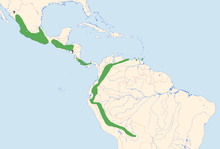Chestnut-collared swift
| Chestnut-collared swift | |
|---|---|
_on_the_nest.jpg) | |
| An adult male on the nest. | |
| Scientific classification | |
| Kingdom: | Animalia |
| Phylum: | Chordata |
| Class: | Aves |
| Order: | Apodiformes |
| Family: | Apodidae |
| Genus: | Streptoprocne |
| Species: | S. rutila |
| Binomial name | |
| Streptoprocne rutila (Vieillot, 1817) | |
 | |
| Range of Streptoprocne rutila | |
| Synonyms | |
|
Cypseloides rutilus | |
The chestnut-collared swift (Streptoprocne rutila) is a resident breeding bird from Mexico and Trinidad south to Peru and Bolivia. It was one of the species of Cypseloides controversially moved to Streptoprocne by the AOU (BLI 2004).
Description
This swift is a medium-sized species, 12.7-13.5 cm long, with a longish tail, and weighing 20 g. The male is blackish with a rufous collar. In females and immatures the rufous collar is incomplete or absent. Young birds also differ from the females in that they have reddish edges to the crown feathers. The Chestnut-collared Swift has a chattering chit-chit-chit call.
Behaviour
Breeding
The chestnut-collared swift builds a nest of mud and plant material on a vertical surface in a damp shady location near water, such as in a cave, under a bridge, or in a culvert. The nest is shaped like a flattened cone, and the two white eggs are incubated by both sexes for 23 days, with a further 40 days to fledging. The young are fed on foodballs made from the collected prey.
Feeding
Chestnut-collared swifts feed in flight on flying insects, especially flying ants, often at a greater height than other swifts. Although breeding occurs at all levels where there are suitable sites, this species usually feeds over hill forests or more open woodland at 500 m or more.
Subspecies
The following subspecies are recognised:[2]
- Streptoprocne rutila brunnitorques (Lafresnaye, 1844)
- Streptoprocne rutila griseifrons (Nelson, 1900)
- Streptoprocne rutila rutila (Vieillot, 1817)
References
- ↑ BirdLife International (2012). "Streptoprocne rutila". IUCN Red List of Threatened Species. Version 2013.2. International Union for Conservation of Nature. Retrieved 26 November 2013.
- ↑ "Streptoprocne rutila". Integrated Taxonomic Information System. Retrieved 1 December 2011.
- Chantler, Phil & Driessens, Gerald (2000): Swifts : a guide to the swifts and treeswifts of the world. Pica Press, Mountfield, East Sussex. ISBN 1-873403-83-6
- ffrench, Richard; O'Neill, John Patton & Eckelberry, Don R. (1991): A guide to the birds of Trinidad and Tobago (2nd edition). Comstock Publishing, Ithaca, N.Y.. ISBN 0-8014-9792-2
- Hilty, Steven L. (2003): Birds of Venezuela. Christopher Helm, London. ISBN 0-7136-6418-5
External links
-
 Media related to Streptoprocne rutila at Wikimedia Commons
Media related to Streptoprocne rutila at Wikimedia Commons -
 Data related to Streptoprocne rutila at Wikispecies
Data related to Streptoprocne rutila at Wikispecies
